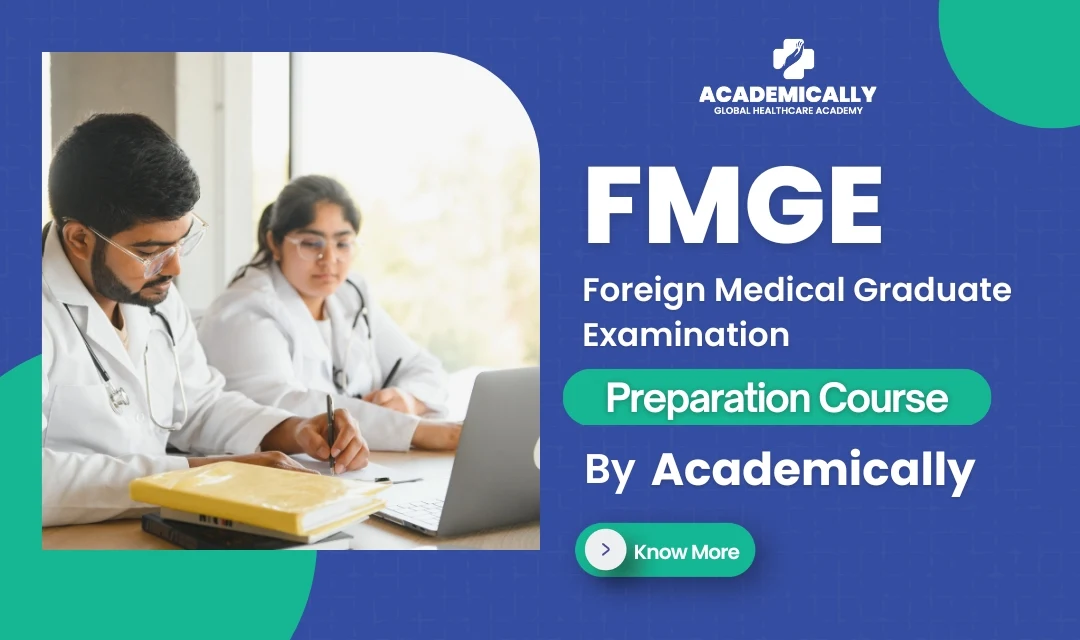So, you’ve completed your MBBS abroad or are planning to study medicine in another country, and now you’re wondering what it takes to practice medicine in India. Well, this is where the Foreign Medical Graduate Examination (FMGE) comes into the picture.
Here is everything you need to know, eligibility, syllabus, exam pattern, and even your career options post-FMGE.
What Exactly is FMGE?
Alright, imagine this: You’ve spent years studying medicine abroad, learning all those anatomy charts, biochemistry formulas, and clinical case studies. But here’s the catch medicine is a serious profession, and India wants to make sure that every doctor practicing here meets certain standards.
That’s why the NBEMS conducts FMGE, a screening test for foreign medical graduates.
The exam ensures that the medical knowledge you gained abroad aligns with what’s expected in India. Think of it like a bridge between your foreign medical education and Indian medical practice. Without passing FMGE, you cannot legally practice medicine in India, and you won’t be able to register with National Medical Council (NMC).
Who is Eligible for FMGE?
Before you start worrying about the syllabus or exam pattern, let’s clear up eligibility. Not everyone can just walk in and take FMGE.
Here’s what you need to qualify:
- Indian Citizenship or OCI: Only Indian citizens and Overseas Citizens of India (OCI) can appear for FMGE.
- Medical Degree: You must have a primary medical qualification (MBBS or equivalent) from a foreign medical school that’s recognized by the WDOMS.
- Registration Abroad: You should have completed your course and be eligible for provisional or permanent registration to practice in the country where you studied.
- Documentation: Keep your passport, medical degree certificate, mark sheets, and other documents handy while applying.
So, if you check all these boxes, congratulations, you’re eligible.

FMGE Exam Pattern
FMGE is a computer-based exam designed to test your medical knowledge. Here’s how it looks:
- Mode: Computer-Based Test (CBT)
- Duration: 5 hours (300 minutes)
- Number of Questions: 300 multiple-choice questions (MCQs)
- Marks Distribution: Each question carries 1 mark; no negative marking.
- Sections:
- Pre-Clinical: Anatomy, Physiology, Biochemistry
- Para-Clinical: Pathology, Microbiology, Pharmacology, Forensic Medicine, Social & Preventive Medicine
- Clinical: Medicine, Surgery, Pediatrics, Obstetrics & Gynecology, ENT, Ophthalmology, Psychiatry, Orthopedics, Dermatology
FMGE Syllabus Breakdown
The syllabus can feel intimidating at first glance, 300 questions covering almost your entire MBBS curriculum. But don’t panic. Let’s break it down in a way that makes sense:
1. Pre-Clinical
- Anatomy: Bones, muscles, organs, nerves—basically everything structural.
- Physiology: How your body works; from blood pressure to kidney function.
- Biochemistry: Proteins, enzymes, metabolic pathways—you know, the molecular stuff.
Pro tip: Focus on high-yield topics that frequently appear in exams. Use diagrams and mnemonics to make things stick.
2. Para-Clinical
- Pathology: Diseases, their causes, and how they affect tissues and organs.
- Microbiology: Bacteria, viruses, fungi, you need to know the enemies.
- Pharmacology: Drugs, their mechanisms, side effects, and uses.
- Forensic Medicine: Legal aspects of medicine, medicolegal cases, poisoning, etc.
- Social & Preventive Medicine (Community Medicine): Epidemiology, health programs, vaccinations, and public health.
Para-clinical subjects are usually scoring sections, so make sure to revise them thoroughly.
3. Clinical
- General Medicine: Heart, lungs, kidneys, infectious diseases, you need to know symptoms, diagnosis, and management.
- Surgery: General surgery, trauma, and some surgical specialties.
- Obstetrics & Gynecology: Pregnancy, labor, female reproductive system disorders.
- Pediatrics: Children’s health, growth monitoring, common childhood illnesses.
- Ophthalmology & ENT: Eye and ear, nose, throat conditions.
- Orthopedics: Bones, joints, fractures, deformities.
- Psychiatry: Mental health disorders and their treatment.
- Dermatology: Skin diseases, infections, rashes.
- Radiology & Anesthesiology: Basic imaging interpretation and anesthesia principles.
Remember, clinical subjects dominate the exam, so case-based questions are very common.
Tips to Crack FMGE
Here’s where we get practical, how do you actually pass this exam?
- Practice MCQs: This is key. Solve previous years’ FMGE papers and online mock tests.
- Revise Clinical Subjects: Focus on common diseases, management guidelines, and diagnostic criteria.
- Use Mnemonics & Charts: Quick revision aids are lifesavers, especially for biochemistry and pharmacology.
- Time Management: You have 5 hours for 300 questions—that’s roughly 1 minute per question. Practice pacing yourself during mock tests.
Career Scope After FMGE
So, you’ve cleared FMGE. Congratulations! But what comes next? Let’s explore your options:
- Medical Registration in India: You can apply for permanent or provisional registration with the MCI/NMC. This makes you a licensed medical practitioner.
- Practice Medicine: Work in hospitals, clinics, or private practice anywhere in India.
- Postgraduate Studies: Eligible for NEET-PG, opening doors to specialties like Cardiology, Surgery, Pediatrics, etc.
- Government Jobs: You can apply for central or state government medical services, including army, public health, or teaching positions.
- Private Sector Opportunities: Hospitals, diagnostic centers, pharmaceutical companies, and healthcare startups.
FMGE opens up a world of opportunities, but it’s also a gateway to credibility. Employers and patients alike trust your competence once you’ve passed this exam.
Final Thoughts
Let’s be honest, FMGE may seem intimidating, but it’s totally manageable with the right strategy. Treat it like a checkpoint rather than a roadblock. Once you clear it, the path to a successful medical career in India opens wide: you can practice, pursue postgraduate studies, or work in both public and private sectors.
Remember: Consistent practice, focused revision, and understanding Indian medical guidelines are your best friends. With determination, FMGE can be your stepping stone to becoming a credible and competent doctor in India.
FMGE isn’t just an exam; it’s a gateway to credibility, opportunities, and a fulfilling medical career in India. Study smart, stay consistent, and you’ll get there!





